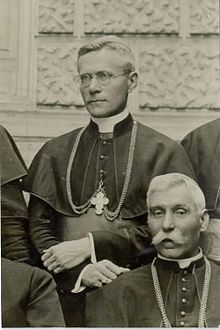| The topic of this article may not meet Misplaced Pages's general notability guideline. Please help to demonstrate the notability of the topic by citing reliable secondary sources that are independent of the topic and provide significant coverage of it beyond a mere trivial mention. If notability cannot be shown, the article is likely to be merged, redirected, or deleted. Find sources: "Josip Srebrnič" – news · newspapers · books · scholar · JSTOR (September 2023) (Learn how and when to remove this message) |

Josip Srebrnič, also spelled Srebrnić, (2 February 1876 – 21 June 1966) was a Slovene Roman Catholic prelate who spent most of his career in Croatia.
Born in a Slovene-speaking family in Solkan, Austria-Hungary (Solkan is now part of Nova Gorica, Slovenia), he was ordained in 1906. In 1923, he became Bishop of Krk in Croatia, then part of the Kingdom of Serbs, Croats and Slovenes. He served as bishop on the island of Krk for almost forty year, until 1961. During this long period, he publicly defended the freedom of the Roman Catholic Church against different authorities. He opposed the unificatory tendencies of the dictatorship of King Alexander I of Yugoslavia; in 1932, he published the booklet Crkvi slobodu! (Freedom to the Church!), in which he denounced the educational and cultural policies of Alexander's royal dictatorship. Between 1941 and 1943, he voiced his opposition to the chauvinist anti-Croatian policies of the Italian Fascist forces, and organized humanitarian help for the prisoners in the Italian Rab concentration camp, which was established on the territory under his ecclesiastical jurisdiction. He continued to publicly defend the personal and human rights of his flock during the Nazi German occupation regime (1943–1945). In 1943 he refused to join the Partisans of the National Liberation Movement in Croatia or even to provide chaplains for Roman Catholic Partisans. After 1945, he was critical of the Yugoslav Communist regime. After the Second World War, he was accused by Yugoslavia of collaborating with the Italian and German regimes.
Srebrnič died in Krk, and he was buried in the Krk Cathedral.
References
- ^ Arhar, Vojan Tihomir (1998). Oživljena tihota: (Cistercijanska opatija Stična 1898-1998). Novo Mesto: Tiskarna Novo mesto, Dolenjska založba. p. 81.
- ^ Goriški zbornik: 1944-1968. Ljubljana: ČZP "Delavska enotnost. 1968. p. 117.
- Kolarič, Jakob (1977). Škof Rožman: duhovna podoba velike osebnosti na prelomnici časa. Klagenfurt: Družba sv. Mohorja. p. 744.
- The Case of Archbishop Stepinac. Washington, DC: Embassy of the Federal Peoples Republic of Yugoslavia. 1947. p. 73.
External links
| Urban Municipality of Nova Gorica | ||
|---|---|---|
| Settlements: | Administrative seat: Nova Gorica |  |
| Landmarks | ||
| Culture and education | ||
| Notable people |
| |